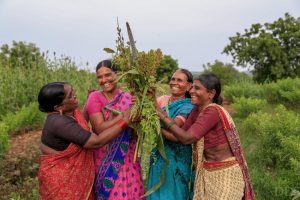Our Farmers
Daana is a network of small farmers. Our goal is to encourage people to buy directly from them and savor the taste of unique heritage varieties of food grown across India.
 Why small farmers? Small farmers (those with a land holding of less than 5 acres) constitute a group of people highly skilled in organic farming, who use minimal to no external input, and have kept alive many traditional systems of farming.
Why small farmers? Small farmers (those with a land holding of less than 5 acres) constitute a group of people highly skilled in organic farming, who use minimal to no external input, and have kept alive many traditional systems of farming.
Most methods of chemical farming require large external inputs, which are expensive. These include water, chemical fertilizers, pesticides and hybrid seeds. Small farmers do not have the luxury of these expensive input based options. Instead they use methods of organic cultivation that produce better quality output, which preserves soil fertility and the natural farm ecosystem. These include:
Native crop varieties, seed conservation, rain-water conservation, mulching, natural fertilizers, inter cropping, crop rotation, as well as taking nature’s cues in planting and harvest timings.
Here are some of our farmers who speak about their work, their lives.
Soundararaj, Nilgiri Bio-reserve (Tamil Nadu)
He grows coffee (mostly Arabica) along with pepper, silk cotton, spices and citrus fruits. His land abuts the forest. He has a small patch of land where he grows vegetables and millets for his own consumption.
Howgir Rao Deshmukh, Kotgir (Telangana)
Howgir-ji has been growing food using natural and organic methods for the past 11 years. He grows rice, mangoes, jowar, maize and some dals. He uses only natural fertilizers and sprays for his crops. (e.g., crushing Neem leaves and soaking them in boiling water and using that extract). He also uses a cover crop called Dhaincha (Jeeluga in Telugu) to increase soil fertility. Once the Dhaincha grows, he tills it into the soil to give it a rich boost of nutrients.
He has 40 acres of which he is cultivating 10 acres. His big challenges are water and labor. He wants to bring more area under cultivation if he is assured of a good market that provides him with fair prices for his produce.
Bhaskar and Lakshmi, Metalkunta (Telangana)
Bhaskar is a tailor who turned to organic farming 10 years ago. He and his wife Lakshmi grow wheat, dals and vegetables in their 11 acres of farm, in Metalkunta village near Zaheerabad, Telangana.
His farm is entirely rainfed. He uses mulch and rain water harvesting methods to maximize water conservation. There are many organic farmers in the region. As a result, the soil’s innate fertility is very high, and groundwater levels are very healthy. A naturally fertile soil has a large capacity to retain moisture. This is not the case in regions that use chemical farming methods. In these regions the soil becomes rock hard and does not have any water retention capacity. Any water poured on it is only washed away, and does not get absorbed.
Tuljamma and group, Bidekanna (Telangana)

Tuljamma (far right) is one of many women farmers in the Zaheerabad area who grow crops organically. They have done so, following traditional methods, for the past 3 generations. Most of them are small farmers, with land holdings between 1-4 acres. Their co-operative society helps women in the villages in various aspects of their life. As a group they are able to help each other out, and are also able to negotiate fair prices for their members.
Tuljamma and a few others have been invited by many groups to provide input on organic farming. She recently attended the International Permaculture Convergence held in Hyderabad, and talked extensively about the health benefits of growing and consuming organic food. The women’s group also participates regularly in coaching people who sign up for organic farming workshops organised by the permaculture society.
Prasad Rao, Ghantasalapalem, Andhra Pradesh

Prasada Rao and Lakshmi garu, from Ghantasalapalem grow rice, pulses and corn, along with vegetables on their 200 acre farm. The technique that they use to grow rice requires minimal weeding and water. They mulch their farms extensively, and sow seeds using the open seed method. They save a lot of water in this way, and the variety is drought hardy and disease resistant. (Rice is often grown in nurseries and then transplanted, requiring a lot of labor and water)
Prabhakar and Vimaltai

Prabhakar and Vimaltai grow wheat, cotton and millets in their family farm. The entire farm is rain fed and does not use any groundwater depleting borewells. The variety of wheat they grow is called Bansi, it is one of the few native varieties of wheat, and does not need much water to grow. They have been using seeds that have been conserved and passed down the generations in their family.
Bichappa, Ibrahimpur, Telangana
Bichappa grows Urad Dal, Moong Dal, a variety of millets and vegetables on his family farm in Ibrahimpur, Telangana. Their farms too, are entirely rain-fed. Seasonal grazing of sheep helps in removing weeds, as well as replenishing the soil with manure.
Yaovan, Nagavar, Telangana
Yaovan grows Moong dal in his family farm, in Nagavar, Telangana. Their farms are entirely rain-fed. Yaovan’s family has been practicing organic farming for generations. A traditional rigorous form of inter-cropping, crop rotation and using hardy heirloom seeds ensures soil fertility, and minimizes pest attack.
